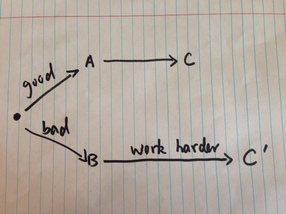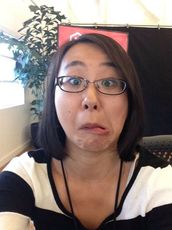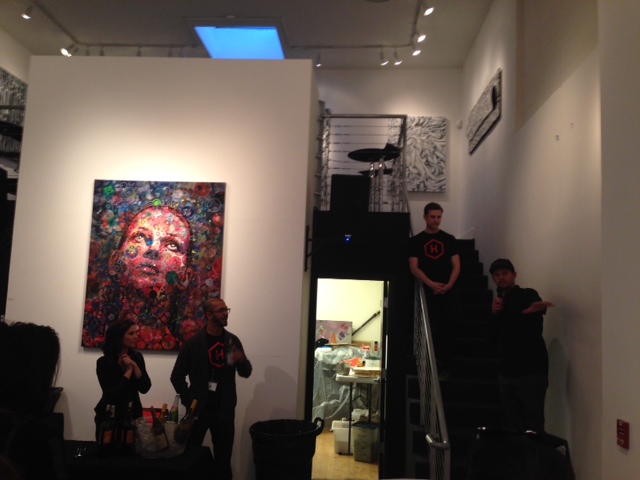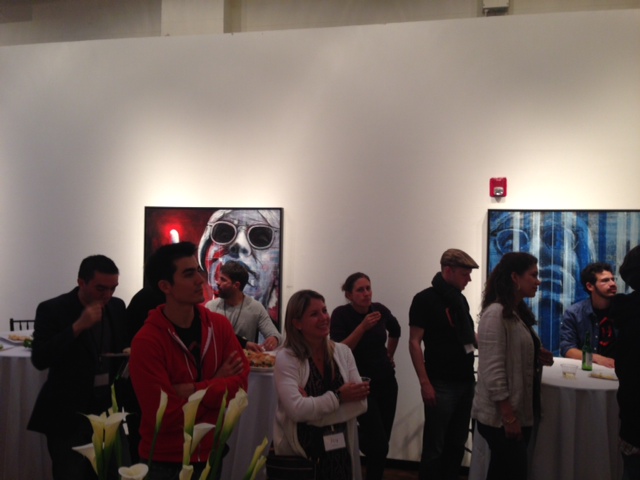This post is a part of a series to document the Hive Global Leaders Program that I went through in San Francisco, March 2014. The other posts in this series are posted below
Introduction
Day 0 (Welcome Reception)
Day 1 (Your World)
Day 2 (Your life)
Day 3 (Your Org)
Conclusion
Day 1 (Your World)
Saturday started bright early at 8:30am at Change.org's headquarter in Potrero Hill. I felt very lucky that I live in the city and can easily roll out of bed to attend the program. Many participants flew in from cities all across the country including one lady coming from Uganda just to attend the program. Among us were an intelligence officer who just came back from Afghanistan, an activist who changed policy for disabled people in Ghana, several serial entrepreneurs who had successfully built many companies, a designer with deep expertise in story-telling, a 24-year old HBS dropout pursuing her dream career in SF, a scientist from NASA, a few directors of non-profits, a finance expert from South Sudan, several innovative educators and me, a recovering management consultant who is building up a business in personal and leadership coaching. Participants at the program ranged from 21 to 39 with the average age of 29 and a half. Throughout our 2-minute long introductions, I felt a sense of youthfulness as well as maturity among the crowd (although I know how strange this might sound). Youthfulness is represented by the hopefulness and eagerness for action among the group, while maturity points to the thoughtfulness and self-awareness of many participants, especially the seemly younger ones. I was both impressed and humbled by this group.
We started the day with some healthy breakfast and a 20-min yoga workout, which was very refreshing and grounding. Today's sessions were all about developing a better understanding of the world and how we can make our contributions to make this world a better place. Below is a complete (as much as I could recall based on memory) list of the sessions from Day1's program and my attempt at capturing some of the highlights and key learning.
Design a Better World (by Ryan Allis)
This session centered around the concept of "the original position" and "the veil of ignorance" , features of John Rawl's theory of Justice. We started by breaking into our small groups and imagined ourselves as souls before our births, not knowing where in the earth we would be born into. We were given the task of coming up with the 2-3 principals of the world as a group. Many things came up during this exercise, respect, love, trust, abundance, fairness, just to name a few. I think the idea was to help us understand from a philosophical level what type of world we would like to create as compassionate human beings. While I was not familiar with John Rawl's philosophy, I thought the session did create a nice grounding for some of the later conversations.
Tacking Human Progress (by Ryan Allis)
During this session Ryan introduced to us a number of key performance indicators that he and his team came up with to measure human progress. The detail of the framework can be seen here. One of the key discussion points of this session was that the advancement of human progress in areas such as health, peace and economics seems to come at the expense of a deteriorating environment. One participant used the analogy of "re-arranging the furniture on the Titanic" to illustrate the danger and concern for where human being is heading towards. We also discussed the inter-relatedness between these metrics, the limitation of these high level metrics (individual community not feeling the progress described) and other metrics could be complimentary to this framework.
The Future of Science & Technology (by Aaron Frank, Singularity University)
I knew nothing about Singularity University before Aaron's talk. After learning about this organization and the projects they work on, two words stood out to me, "exponential" and "technology". According to its website, Singularly University's mission is to "educate, inspire and empower leaders to apply exponential technologies to address humanity’s grand challenges". They run executive educational programs, graduate programs as well as other innovation focused conferences and programs to accelerate technology to address humanity's biggest problems. Aaron walked us through the evidence of exponential technology growth and showcased the type of technology innovations in clean energy, nanotech, genomics, neuroscience, big data, etc. After watching IBM's Watson using machine learning capabilities to beat other jeopardy contestants and hearing about lab grown leather bags and hamburgers, we were left to ponder in awe and some level of fear of this exponential growth. I was not the only who felt a little scared of this anticipated rapid growth of technological innovation. I could not help but wonder about what this all meant for human beings and the world. Too bad that we ran out of time for a nice debate around this topic.
Using Business for Scalable & Sustainable Change (Ben Rattray, CEO, Change.org)
In this session, we learned about Ben's story building Change.org. Like most entrepreneurs, Ben's journey of triumph was preceded by lots of failure, heartbreaks and difficult times. It was encouraging to hear that he stuck to what he believes in and continued to pursue his purpose no matter what happened. A couple of key learning points that stood out for me.
Introduction
Day 0 (Welcome Reception)
Day 1 (Your World)
Day 2 (Your life)
Day 3 (Your Org)
Conclusion
Day 1 (Your World)
Saturday started bright early at 8:30am at Change.org's headquarter in Potrero Hill. I felt very lucky that I live in the city and can easily roll out of bed to attend the program. Many participants flew in from cities all across the country including one lady coming from Uganda just to attend the program. Among us were an intelligence officer who just came back from Afghanistan, an activist who changed policy for disabled people in Ghana, several serial entrepreneurs who had successfully built many companies, a designer with deep expertise in story-telling, a 24-year old HBS dropout pursuing her dream career in SF, a scientist from NASA, a few directors of non-profits, a finance expert from South Sudan, several innovative educators and me, a recovering management consultant who is building up a business in personal and leadership coaching. Participants at the program ranged from 21 to 39 with the average age of 29 and a half. Throughout our 2-minute long introductions, I felt a sense of youthfulness as well as maturity among the crowd (although I know how strange this might sound). Youthfulness is represented by the hopefulness and eagerness for action among the group, while maturity points to the thoughtfulness and self-awareness of many participants, especially the seemly younger ones. I was both impressed and humbled by this group.
We started the day with some healthy breakfast and a 20-min yoga workout, which was very refreshing and grounding. Today's sessions were all about developing a better understanding of the world and how we can make our contributions to make this world a better place. Below is a complete (as much as I could recall based on memory) list of the sessions from Day1's program and my attempt at capturing some of the highlights and key learning.
Design a Better World (by Ryan Allis)
This session centered around the concept of "the original position" and "the veil of ignorance" , features of John Rawl's theory of Justice. We started by breaking into our small groups and imagined ourselves as souls before our births, not knowing where in the earth we would be born into. We were given the task of coming up with the 2-3 principals of the world as a group. Many things came up during this exercise, respect, love, trust, abundance, fairness, just to name a few. I think the idea was to help us understand from a philosophical level what type of world we would like to create as compassionate human beings. While I was not familiar with John Rawl's philosophy, I thought the session did create a nice grounding for some of the later conversations.
Tacking Human Progress (by Ryan Allis)
During this session Ryan introduced to us a number of key performance indicators that he and his team came up with to measure human progress. The detail of the framework can be seen here. One of the key discussion points of this session was that the advancement of human progress in areas such as health, peace and economics seems to come at the expense of a deteriorating environment. One participant used the analogy of "re-arranging the furniture on the Titanic" to illustrate the danger and concern for where human being is heading towards. We also discussed the inter-relatedness between these metrics, the limitation of these high level metrics (individual community not feeling the progress described) and other metrics could be complimentary to this framework.
The Future of Science & Technology (by Aaron Frank, Singularity University)
I knew nothing about Singularity University before Aaron's talk. After learning about this organization and the projects they work on, two words stood out to me, "exponential" and "technology". According to its website, Singularly University's mission is to "educate, inspire and empower leaders to apply exponential technologies to address humanity’s grand challenges". They run executive educational programs, graduate programs as well as other innovation focused conferences and programs to accelerate technology to address humanity's biggest problems. Aaron walked us through the evidence of exponential technology growth and showcased the type of technology innovations in clean energy, nanotech, genomics, neuroscience, big data, etc. After watching IBM's Watson using machine learning capabilities to beat other jeopardy contestants and hearing about lab grown leather bags and hamburgers, we were left to ponder in awe and some level of fear of this exponential growth. I was not the only who felt a little scared of this anticipated rapid growth of technological innovation. I could not help but wonder about what this all meant for human beings and the world. Too bad that we ran out of time for a nice debate around this topic.
Using Business for Scalable & Sustainable Change (Ben Rattray, CEO, Change.org)
In this session, we learned about Ben's story building Change.org. Like most entrepreneurs, Ben's journey of triumph was preceded by lots of failure, heartbreaks and difficult times. It was encouraging to hear that he stuck to what he believes in and continued to pursue his purpose no matter what happened. A couple of key learning points that stood out for me.
- See failure as learning opportunities with potentials for growth. Sometimes, because you failed, you worked harder and ended up achieving things you would not have achieved if you did not fail earlier. Illustrated by the graph below.
- In general, work on something you are so passionate about, even if you fail, you will be proud that you tried.
- Choosing between for-profit and non-profit for your mission-driven company is a pragmatic choice. Instead of thinking about revenue as a separate, annoying thing that you have to deal with, think of it as an integral part of your mission. How can you pursue revenue that can advance your mission?
In my opinion (and many Hivers would agree with me as well), this was the best talk of the day. This is not just because the content was so innovative and ground-breaking, it is because Tom Chi is one of the smartest yet one of the most humble people that I have ever encountered. I think half of the class became his fan after his short 20 minute presentation. You can learn more about Tom and hear his talk at Ted-Ed below about how he led user experience design for Google Glass. In his short 20 minute talk, Tom shared with us his experience using rapid prototyping techniques to innovate at Google X and many different social innovation projects that he had been involved with. He also shared with us some of his thoughts and life philosophies around innovation, human psychology and social change. Some of the key takeaways from his talks include
- Doing is the best kind of thinking.
- Maximize rate of learning, minimize the time to try new things.
- When encountering failure, focus on the 15% that worked well instead of the part that didn't work. This will help your brain avoid rejecting the whole experience and foster positivity and creativity which is conductive for future success.
- Think before I do = 100% optimization on 20% of variables
- Do before I think = discover 70% of variables along the way of trying
- Social change (or any form of behavioral change) requires shift in mindset.
- Identity is the enemy of possibility, therefore, we should hold both loosely. (For Tom Chi, he changes jobs/positions every few years, as a process in destroying his identity and discover new possibilities).
How to Start a Global Movement (by Jenny Sauer-Klein, AcroYoga, the Movement Blueprint)
Jenny is the founder of AcroYoga, a movement and a community of physical practice that combine yoga and acrobatics. After a number of years of being the "queen" of AcroYoga and creating a global community of tens of thousands of participants, Jenny decided to leave the movement and start a new phase of her life. She shared with us the challenges she faced letting her "baby" go, seeing her movement continue to flourish after her departure, and finding her new purpose in life through teaching others about starting their own movements. You can find some of the basic steps of her movement blueprint on her website. I simply thought she had an amazing story building up AcroYoga and I applaud her for being able to leave her legacy behind and create new identity for herself.
Disconnect to Reconnect (by Levi Felix, Campgrounded, Digital Detox)
I knew this was going to be a unique session because the first thing Levi asked us to do was to take a selfie with a strange face and posted on Facebook. Here is the picture I shared on my timeline.
We were then asked to leave our phone at our chair and go out for a walk. Bathed in the warm and beautiful afternoon sun of San Francisco, the fifty of us ran around on a patch of green grass and played a silly game like school children. "We should take a picture of this!" someone burst out only realizing a second later that none of us had our phone with us. How ironic that in our modern day of technology, "capturing and sharing within our social media" becomes more important than "staying present and savoring the goodness right in front of our eyes".
After an exhilarating 15 minutes of laughing and playing and running, we sat in the grass and learned about Levi's personal journey evolving from an overworked start-up executive on the brink of breaking down to someone whose life purpose is to help others unplug and stay connected with each other on a human level. Levi's story deeply resonated with me as I reflected on my semi-addictive behavior with technology. I made a mental note in my mind that I would try to implement one "unplug" day per weekend with my husband so that we could spend more time being present with each other.
Dinner/Reception
Our first day ended with a casual cocktail/dinner at Ian Ross Gallery, a beautiful art gallery in SOMA. As we exchanged thoughts around today's learning over delicious dumplings and sliders, I felt a sense of hopefulness, optimism and a strong eagerness to take action. It was amazing that in one day, we learned about the fascinating future of technology, thought about how we can take small yet quick actions to create change or a movement, felt the liberation of unplugging and made genuine face-to-face connections with one another. Many of us were very impressed with the caliber of speakers from the first day and we all looked forward to the next two days' programs.
After an exhilarating 15 minutes of laughing and playing and running, we sat in the grass and learned about Levi's personal journey evolving from an overworked start-up executive on the brink of breaking down to someone whose life purpose is to help others unplug and stay connected with each other on a human level. Levi's story deeply resonated with me as I reflected on my semi-addictive behavior with technology. I made a mental note in my mind that I would try to implement one "unplug" day per weekend with my husband so that we could spend more time being present with each other.
Dinner/Reception
Our first day ended with a casual cocktail/dinner at Ian Ross Gallery, a beautiful art gallery in SOMA. As we exchanged thoughts around today's learning over delicious dumplings and sliders, I felt a sense of hopefulness, optimism and a strong eagerness to take action. It was amazing that in one day, we learned about the fascinating future of technology, thought about how we can take small yet quick actions to create change or a movement, felt the liberation of unplugging and made genuine face-to-face connections with one another. Many of us were very impressed with the caliber of speakers from the first day and we all looked forward to the next two days' programs.
Read about my experiences during the other days at Hive
Introduction
Day 0 (Welcome Reception)
Day 1 (Your World)
Day 2 (Your life)
Day 3 (Your Org)
Conclusion
Introduction
Day 0 (Welcome Reception)
Day 1 (Your World)
Day 2 (Your life)
Day 3 (Your Org)
Conclusion





